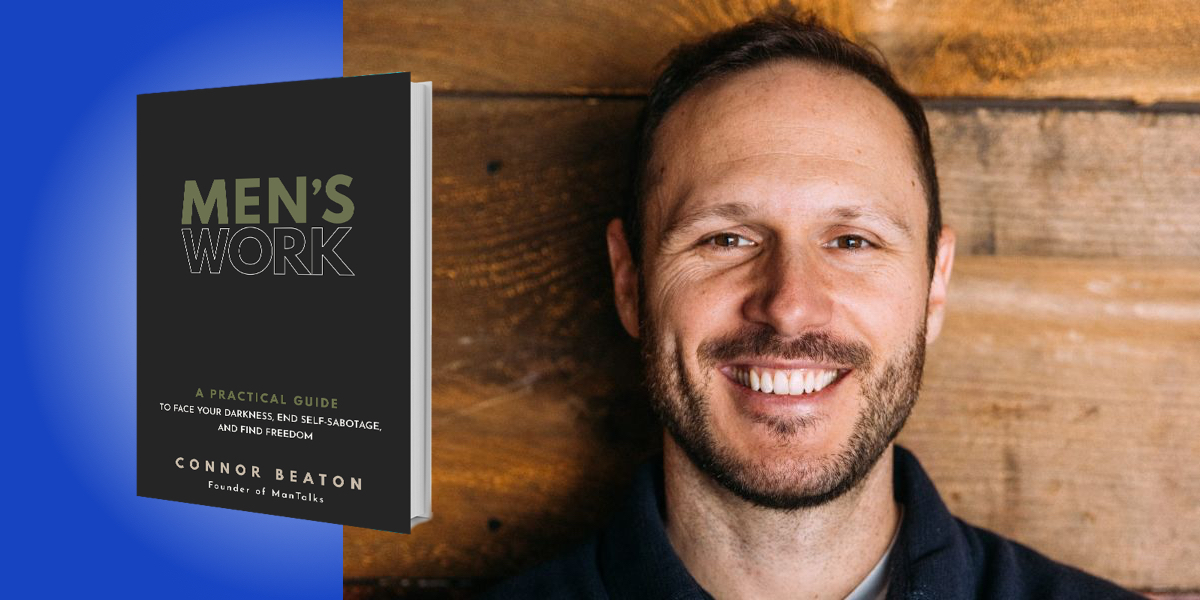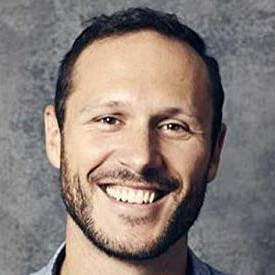Connor Beaton is the founder of ManTalks, an international organization focused on men’s wellness, success, and fulfillment. He runs the top ranked podcast, ManTalks, and has spent a decade working with men. Connor has spoken on stage at TEDx, in dozens of cities internationally, and has been featured on platforms like the United Nations, Forbes, Huffington Post, HeForShe, The Good Men Project, CBC, and the National Post.
Below, Connor shares 5 key insights from his new book, Men’s Work: A Practical Guide to Face Your Darkness, End Self-Sabotage, and Find Freedom. Listen to the audio version—read by Connor himself—in the Next Big Idea App.

1. The plague of absent fathers.
Many men will grow up or have grown up without any significant father figure or male figure in their life. In the U.S. alone, roughly one in four children will grow up in a household without a father figure.
The impact of this is substantial: 63 percent of youth suicides, for example, are from fatherless homes; 90 percent of all homeless and runaway children are from fatherless homes—which is 32 times the average; 85 percent of all children who show behavioral disorders come from fatherless homes; and 71 percent of all high school dropouts also come from fatherless homes. Inarguably, not having a father or male figure present in the house is quite detrimental, specifically to boys and young men.
An absent father isn’t just a father who is completely missing from your life. It can be that you only see your father once or twice a month, or that your father is present, but he’s a workaholic. Or maybe he’s an alcoholic or addicted to some substance or drug. It can be that he’s there, but he’s abusive, or emotionally absent. There are many different forms of an absent father.
2. The law of isolation.
The simple breakdown of the law of isolation is that isolation equals amplification. So when you isolate, you amplify the problem, not solve it. Yet, for many men, when something is challenging or taxing—within our relationships, our finances, our mental health or emotional health—many of us will isolate ourselves. You can see this in a lot of relationships. A couple gets into a fight and the man will shut down. Maybe he’ll leave the apartment or the house, or he’ll just stonewall and not communicate, refusing to express what’s going on within him. And that isolation feeds the problem. It feeds whatever he’s experiencing internally. So if that man is feeling angry or rejected or neglected in some way, that isolation will amplify his internal experience, or it will amplify the perceived problem in the relationship. As men, we need to move away from this Lone Ranger/Marlboro man approach that many of us have been pitched.
An important, related concept is what I refer to as the myth of male vulnerability. In the modern mainstream narrative, men are struggling and in decline in some capacity. And to a large degree, this is true. We can see this in the data: young boys are struggling within the education system; their grades are significantly worse than young girls. Fewer men are graduating from college, and fewer men are entering into the workforce. There are a lot of challenges that men are facing within our modern culture.
“As men, we need to move away from this Lone Ranger/Marlboro man approach that many of us have been pitched.”
The solution that’s being proposed is that men just need to be more vulnerable. And while there is merit in being vulnerable, there’s also an inherent risk that men know that they undertake by being vulnerable. If a man is vulnerable in his relationship or at work or with his friends, there’s the knowledge that he’s risking rejection, abandonment, or ostracization, from that circle, social environment, or relationship. And so recommending vulnerability as the solution to all of men’s problems is a fallacy.
3. When, how, and whom you share with really matters.
For a lot of men, when they decide to open up, to be vulnerable and talk about what they’re experiencing or struggling with, sometimes it can come out sideways. They just bring up everything—all their problems and challenges—and emotionally vomit on their partner or with the one person in their life that they turn to. But outsourcing their entire internal process, all of what they’re feeling and experiencing onto somebody else, in the hopes of getting some form of external feedback—maybe approval, praise, or recognition—often ends up proving overwhelming.
4. Some men aren’t struggling with vulnerability, but with feeling capable enough in their life.
For some men, it’s not that they need to be more vulnerable with the people around them in order to cure what ails them—whether it’s their anxieties, insecurities, fears, or depression—it’s that they are battling with feeling woefully incompetent, not having the skills or the traits that they believe are going to add value to their relationship, community, family, or friends. And men inherently want to be able to contribute. In some ways, men want to feel needed and necessary.
Simply talking about what they’re feeling doesn’t actually solve the problem of what they’re experiencing. What they actually need to do is go out and train themselves in some type of skill, or develop a certain attribute that they can bring into a relationship or a work environment that will allow them to feel more capable, competent, and contributive to that environment.
5. Moving past pornography.
Porn is a very sensitive subject. Many people get into debates about whether it is morally good or bad, socially good or bad, etc. I look at it from the perspective of simple practicality—what do you do if you are a man who wants to move past using pornography?—which many men do. There are a lot of movements and conversations happening online where men want to stop using pornography or have realized that they are perhaps using pornography in an unhealthy way in their life.
“Porn for many men has become a tool or a default mechanism that they unconsciously use to regulate and calm their internal state.”
An essential concept of my approach is understanding that porn is a supranormal experience—that it is above normal. As an example, when we eat a Thanksgiving dinner, for the most part, we consume more than we would normally consume: more calories, more content. And our system, our body, our stomach, are taking in more than we would normally eat. Porn is a very similar experience. Your brain and your body are taking in more stimulus—more data, more information, more arousal—than they would normally take in because you have access to pretty much anything that you could dream of just a click away.
This supranormal experience can be quite detrimental if used on a regular basis. Many men are finding that when they use pornography as the main staple for their sexual diet, it can alter their expectations for their sex life, diminish their sexual connection with their partner, and have a net negative impact on their sexual relationships.
Porn for many men has become a tool or a default mechanism that they unconsciously use to regulate and calm their internal state. Many of the men that I’ve worked with over the years have described how oftentimes they watch pornography not because they’re aroused, but because they’re bored or anxious, nervous or frustrated, or they feel lonely, rejected, or embarrassed, and they don’t want to feel that way. Porn is the natural thing that they turn to that allows them to feel better. Because on the other side of watching porn is a dopamine hit where you naturally feel better.
I am happy to say that I have worked with thousands of men over the years to help them let go of porn, to help them embrace their own sexual arousal in a way that has allowed them to feel more fulfilled within the context of their intimate relationships.
To listen to the audio version read by author Connor Beaton, download the Next Big Idea App today:
































